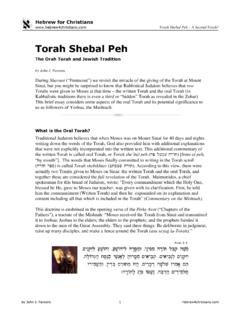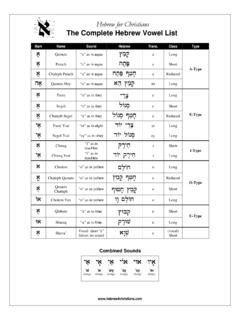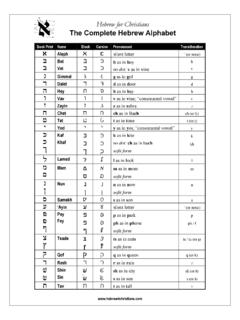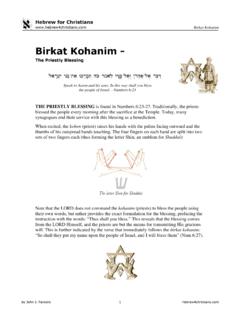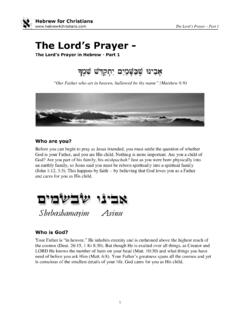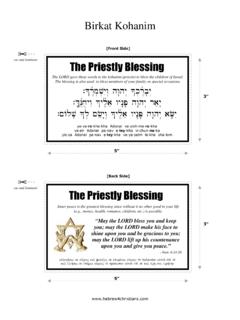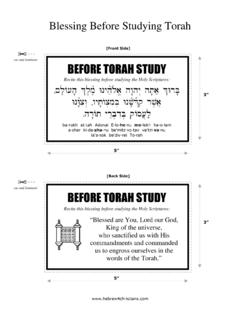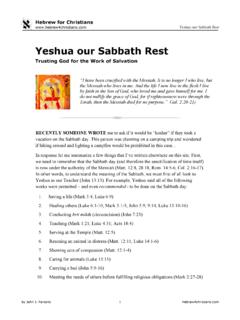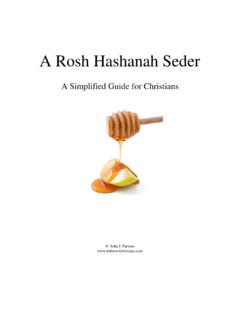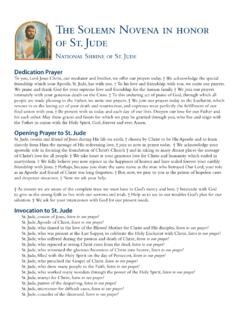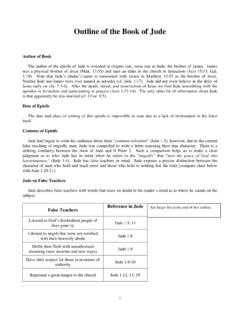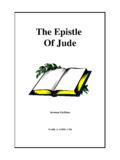Transcription of The Message of Jude
1 Hebrew for Christians 1 The Message of The following overview of the Book of jude is related to this week s Torah reading, parashat Korach. Our Torah portion this week centers on the rebellion of Korach, a man who questioned God s authority and arrogantly sought to intrude into the office of the priesthood. It is noteworthy that his rebellion is explicitly mentioned only once in the New Testament - in the Book of jude - as an example of the fate that awaits those false teachers who likewise despise God s law.
2 Unfortunately, jude s warning is often neglected today, probably because people feel uncomfortable over the prospect of God s judgment. After all, in our politically correct age, people have been indoctrinated to regard tolerance as the greatest of virtues and intolerance (even of evil) as the greatest of Most unbelievers don t mind hearing the good news of God s love, but they take exception when they are confronted with their personal duty to live according to the moral truth revealed in the Torah.
3 False teachers within the church are dangerous because they feed on this sense of discomfort and attempt to rationalize it away. jude identifies them as spiritual impostors who work from the inside to confound or obscure the truth of God. Such a charlatan may appear to be a genuine believer, but their hidden agenda is to sow confusion and sin among God s children. They are proverbial wolves in sheep s clothing (Matt. 7:15). jude s warning is especially important for us to heed in this present hour, because in the time immediately preceding the coming of the Messiah, spiritual deception and unbridled godlessness will greatly increase (2 Tim.)
4 3:1-5). jude ( , Judah) was the brother of James, the original leader of the believers in Jerusalem who ardently called on followers of Yeshua to perform acts of righteousness to demonstrate genuine faith (James 1:22; 2:14-26). The Book of Acts records that it was James - along with the elders in Jerusalem - who advised the apostle Paul to demonstrate his allegiance to the Torah by offering sacrifices at the Temple (Acts 21:18-26). Both James and jude were half-brothers of Yeshua, though at first they did not believe his messianic claims (John 7:5; Mark 3:31-34).
5 After the resurrection Yeshua personally appeared to James (1 Cor. 15:7), who later became the leader of the original Messianic The Message of jude Further Thoughts on Parashat Korach Hebrew for Christians 2 The Message of assembly in Jerusalem (Gal. 2:9). The events surrounding the conversion of jude are not recorded in the New Testament, though in the salutation of his letter he simply identified himself as a slave of Yeshua the Messiah and the brother of James ( jude 1:1), assuming that his readers would be fully aware of his identity within the Messianic community.
6 jude apparently attached no weight to his earlier family relationship with Yeshua as his half-brother, especially in light of Yeshua s teaching that his true family were those who trusted in him (Matt. 12:48-49). At first jude had intended to write something else, but he then felt compelled by the Holy Spirit to warn us about the infiltration of false teachers and to earnestly contend for ( , evpagwni,zomai, agonize over ) the faith that was once and for all delivered to the saints ( jude 1:3). It should be noted here that there are strong correspondences between jude s letter and Peter s second letter ( , 2 Pet.)
7 2:1-3:3). jude begins his letter by warning his readers that certain people have crept in among you who pervert the Message of the grace of God by implying that we are free to sin ( jude 1:4). Notice that jude said these men had crept in (pareisdu,w), a derogatory word that means they sidestepped or entered around the honest The word translated pervert in this verse might better be rendered as exchanged or turned around ( , metati,qhmi), since these teachers interpreted God s grace to be licentiousness (avse,lgeia), that is, a license for sin.
8 Perhaps these creeps taught that because of the sacrifice of Yeshua, the Torah of Moses was made obsolete, and therefore the truth of God was all about unconditional love based solely on faith -- regardless of our behavior. This is sometimes called antinomianism (from a , against + , law ), a false doctrine that claims that a believer in Yeshua is freed from all laws (including the moral law of God expressed in the Torah). We find evidence of this lawless line of thinking in some of the writings of the early Greek christian fathers.
9 It is important to see that the primary characteristic of a false teacher is that they deny our only Master and LORD, Yeshua the Messiah -- that is, they deny His moral authority and identity as the LORD God. Since jude is writing to those who are beloved by God, that is, to sincere Jewish believers, he is careful to remind us that it was Yeshua Himself who saved the people from Egypt -- but afterward destroyed those who did not believe ( jude 1:5). In other words, jude wanted to ensure that we fully understand that it was Yeshua who was the thunderous Voice of the Living God speaking from the midst of the fire at Sinai (Deut.)
10 5:26), and therefore to regard Him as none other than the great Lawgiver Himself (Matt. 5:17-7:29). That is why he is called our only Master and LORD, and to esteem him as anything less is to deny the reality and truth of God. Hebrew for Christians 3 The Message of Many churches today teach that we can (and should) disregard the moral law of God. They may give lip service to the old testament, and they may claim it is still of historical interest that provides some interesting stories, but they arrogantly discount its essential Message of holiness as being inapplicable to our daily lives.
